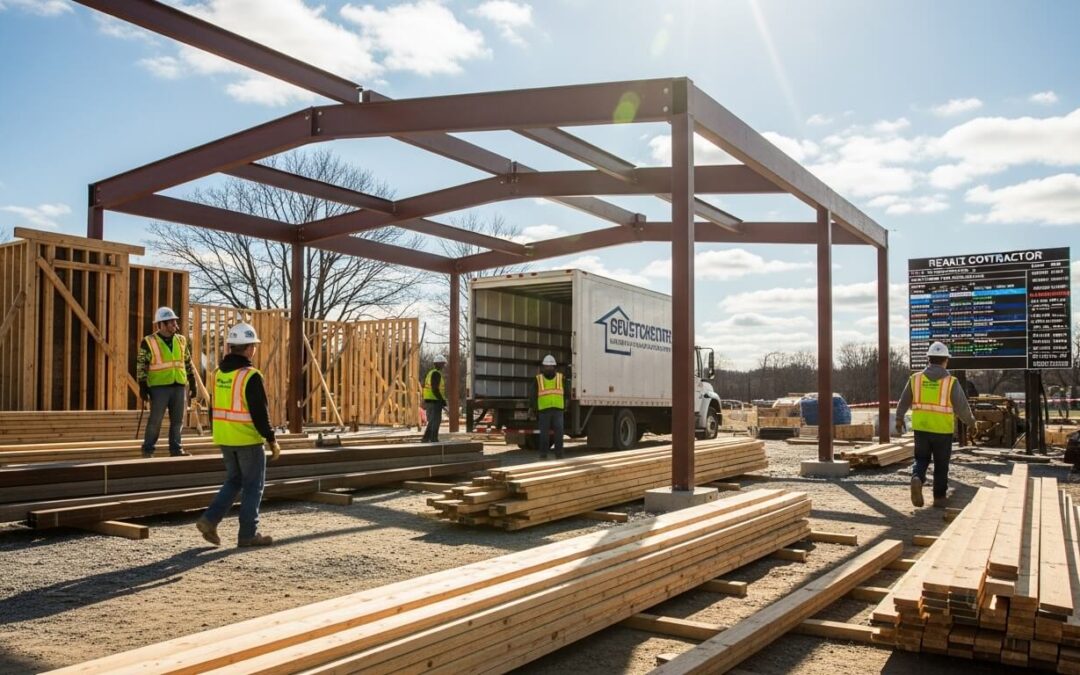General contractors in Westchester tackle supply chain challenges by staying informed about material costs and maintaining strong relationships with local suppliers. They leverage technology to streamline procurement processes and adapt project management techniques to enhance flexibility. By regularly evaluating project timelines and fostering open communication among team members, they keep projects on track. This approach not only minimizes risks but also positions them to respond effectively to emerging trends. There’s more insight into their strategies ahead.
Understanding the Current Supply Chain Landscape
As you navigate the complexities of the construction industry in Westchester, understanding the current supply chain landscape is essential.
You’ll face challenges like fluctuating material costs, delayed shipments, and labor shortages. Staying informed about local suppliers and industry trends can help you anticipate issues before they arise.
Keep an eye on market demands and regulations that might impact your projects. Establishing a clear inventory management system will allow you to track supplies effectively.
Finally, using technology to streamline communication and project management can enhance your efficiency, ensuring you’re prepared to tackle any obstacles that come your way in this dynamic environment.
Building Strong Relationships With Suppliers
Building strong relationships with suppliers is essential for ensuring your construction projects run smoothly. When you foster trust and open communication, it leads to better collaboration and timely deliveries.
Make an effort to understand your suppliers’ needs and challenges; this mutual respect can improve your partnerships. Regular check-ins and feedback sessions can also enhance transparency and address potential issues early.
By prioritizing these relationships, you’ll likely secure better pricing and priority service during high-demand periods. Remember, a reliable supplier can make all the difference in maintaining your project timelines and overall success.
Invest in these connections for long-term benefits.
Implementing Innovative Procurement Strategies
While traditional procurement methods have their place, embracing innovative strategies can greatly enhance your project’s efficiency and cost-effectiveness.
Consider leveraging technology, like procurement software and online marketplaces, to streamline your purchasing process. Establishing a just-in-time inventory system can reduce waste and guarantee materials arrive as needed.
Don’t overlook collaboration with suppliers, encouraging them to share insights on market trends and upcoming challenges. By diversifying your supplier base, you’ll minimize risks associated with relying on a single source.
Implementing these innovative strategies not only improves your procurement process but also positions you to better navigate the complexities of today’s supply chain landscape.
Adapting Project Management Techniques
To successfully navigate the complexities of today’s construction landscape, adapting your project management techniques is essential.
Embrace agile methodologies to enhance flexibility and responsiveness. Regularly assess project timelines and resource allocations, allowing for quick adjustments as supply chain disruptions arise.
Foster open communication with your team and stakeholders to keep everyone informed and engaged. Utilize technology, like project management software, to streamline processes and improve collaboration.
By prioritizing proactive planning and continuous improvement, you can better manage risks and guarantee project success, even in challenging circumstances.
Lessons Learned and Future Outlook
Steering through the complexities of supply chain challenges has taught contractors valuable lessons that will shape future projects.
You’ve learned the importance of building strong relationships with suppliers and diversifying your sources to avoid disruptions. Embracing technology for better inventory management and communication has proven essential.
As you look ahead, flexibility and adaptability will be key. You’ll need to stay informed about market trends and anticipate potential challenges. Investing in training your team to be proactive prepares you for whatever comes next.
Frequently Asked Questions
How Do Contractors Prioritize Projects Amid Supply Chain Disruptions?
Contractors prioritize projects by evaluating urgency, available resources, and client needs.
They adapt schedules, communicate regularly, and leverage relationships with suppliers to mitigate delays, ensuring essential tasks get completed efficiently despite disruptions.
What Role Does Technology Play in Managing Supply Chain Issues?
Technology streamlines communication, tracks inventory, and forecasts demand, helping you anticipate supply chain issues.
Are Local Suppliers Preferred Over National Ones During Shortages?
Yes, you’ll often find local suppliers preferred over national ones during shortages.
They offer quicker delivery, more reliable service, and a better understanding of local needs, which can be essential in overcoming supply chain disruptions.
How Do Contractors Communicate Delays to Clients Effectively?
You keep clients informed by providing timely updates, using clear language, and explaining the reasons behind delays.
Regular check-ins and transparent communication help manage expectations and build trust throughout the project’s progress.
What Contingency Plans Do Contractors Have for Unexpected Supply Chain Issues?
Contractors often develop contingency plans by identifying alternative suppliers, adjusting project timelines, and maintaining open communication with you.
They also assess inventory levels regularly to anticipate issues, ensuring your project stays on track despite unexpected challenges.
Conclusion
In navigating the current supply chain challenges, you’ve seen how essential it is to build strong relationships with suppliers and adopt innovative procurement strategies. By adapting your project management techniques, you not only overcome obstacles but also position yourself for future success. Remember, staying flexible and learning from each experience will help you thrive in an ever-changing landscape. Embrace these lessons, and you’ll be better prepared to tackle whatever challenges come your way.

